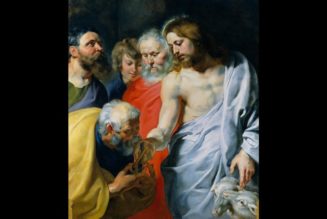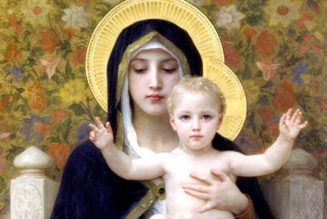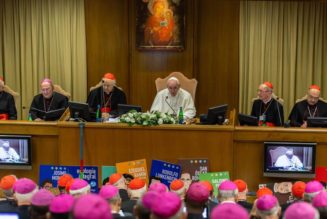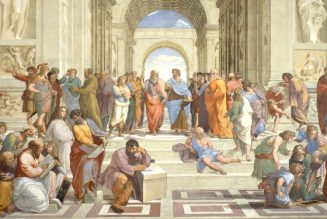
Jesus tells the story of the Prodigal Son on the Fourth Sunday of Lent, Year C, and all the things we typically say about it are true.
But there are two very clear meanings of the parable that I hadn’t noticed all my life, even though they are plain and obvious. Maybe the truths were too painful to look directly at …
First, though, the typical way we read the Parable is absolutely true and extremely important.
This parable has been called “the best short story ever told.” In brief rich phrases it delivers deep insights about each of its three main characters, and through them about our relationship with God.
If you focus on the Prodigal Son, the story teaches about sin and conversion.
- It tells us that to sin is to take the gifts God gives us and spend them on ourselves in a “distant country.”
- It tells us that to repent is to realize that sin makes us miserable, and decide to stop.
- It tells us that conversion requires confession, and that when we confess, God embraces us and gives us a ring and a robe, making us his adopted children.
Focus on the loving father and the story teaches about who God is.
- It tells us that God gives us radical freedom — freedom to embrace him in love, or freedom to pack up and leave.
- It tells us that God longs for us — he is waiting for us in the world’s roadways looking for us, then running out to meet us in beauty, truth and goodness to walk us home.
- It tells us that God showers us with grace — saying “Everything I have is yours.”
Focus on the angry brother and it teaches religious people’s common errors about God.
- Like the brother demanding the father come outside to talk to him, we want God to act on our terms.
- Like the brother saying “not once did I disobey your orders,” we treat God like he owes us favors for obedience.
- Like the brother complaining that he never got a “goat to feast on with my friends” we want God to serve our goals, not vice versa.
The story tells us that we are “relentlessly pursued and ridiculously celebrated” by God, to use Father Mike Schmitz’s words. And it shares the incredible truth that God sees us as family.
But that is also the parable’s first disquieting truth. How many of us treat our own families the wrong way?
The parables of Jesus are often tall tales — about a servant who owes an impossible amount of money, about someone with a plank in his eye, or a camel trying to pass through the eye of a needle. In this case, Jesus tells a tale of a shocking and degrading act a terrible person might do. And what is that heinous action? He takes what he can get and leaves his family.
But how many of us did exactly that? How many of us took our family’s help in life — money for education, car, or house — and then effectively cut ourselves off from them? How many of us live in a place that is a “distant country” compared to where our father, mother, brothers, sons, or children live?
And how many of us spend money prodigally on self-centered pleasures, racking up more debt than we can repay?
Or, if we are with our family, how many of us treat them like the elder brother does? He is always off on his own, out in the field, standing apart from the rest, pursuing his own desires. Are we like that?
Yes, there are factors that make our circumstances different and less drastic — we move out and away for work or school, not to waste the family money, and we have planes and cars and telephones making “distant countries” less distant. Nonetheless, it should at least give us pause that when Jesus wanted to name to worst thing imaginable, he named “moving far away from the home you grew up in.”
So, on the literal level of the family, the parable convicts us. But it hurts even more when you realize what this family stands for.
What is the father’s house, by analogy?
- St. Ambrose compares the Prodigal son to those who “depart from the Church.”
- St. Augustine says that when the son returns, he has to confess to be “reestablished in the Church” and then feasts like we do at Mass.
- St. John Chrysostom says the ring the son receives is a sign of how “Christ espouses his Church.”
So, the father’s house is the Church. Why is this disquieting? Because it puts many of us in the position of the older brother.
I’ve always been fascinated by the question “Why did the Prodigal Son leave?” and “Why was the older brother so angry?” The clues are there in the text: The brothers didn’t like their father and they didn’t like each other much either. They didn’t like the way their father did things, and either avoided him altogether or obeyed him grudgingly. And of course, the angrily faithful brother disliked the carelessly unfaithful brother, and and I’m sure the feeling was mutual.
Isn’t that what happens today?
We don’t like the way the Church does things and we don’t like our brothers and sisters in the Church much, either. Maybe it’s “close-minded traditionalists” we don’t like, or maybe it’s the “spineless modernists” — maybe it’s people who are too mean that we don’t like, or maybe it’s people who are too nice, so nice they never stand up for the truth.
I often feel exactly like the older brother felt.
He said: “Look, all these years I served you and not once did I disobey your orders; yet you never gave me even a young goat to feast on with my friends.”
My version of that complaint sounds like this: “All these years I have done my duty by the Church, giving time, talent and treasure. I don’t disobey your orders — I don’t miss Mass or confession. I respect liturgical rules and I even obey Humane Vitae.
“And what do I get in return? The whole Church is built for people who don’t care about liturgical rules, so that I’m the bad guy for wanting them kept. And every Catholic institution seems built for people who disobey Humanae Vitae, such that I can’t afford the Friday Night Fish Fry for my family, let alone Catholic schools.
“So I homeschool, because I can afford that, and because the more time kids spend with their parents, the more likely they are to keep their faith. And how does the Church treat homeschoolers? We are barely acknowledged at all, and often treated with disdain.”
I do fight the thought, hard, but there it is. Many of us think that way, and keep the Church at arm’s length. We avoid it, parish hopping to make the Church suit our tastes, or simply take what we can get — the sacraments — and skip everything else. We offer begrudging obedience, but not love.
In other words, we are exactly like the older brother:
- We want God to act on our terms.
- We treat God like he owes us favors for obedience.
- We want God to serve our goals, not vice versa.
The dark secret is that the prodigal son and the older brother were not that different. They both had a transactional relationship with the father — one just cashed in all at once. The other extracted what he wanted over time. That’s the relationship many of us have with the Church. Instead, we should participate in our parish life, and make it more vibrant and faithful.
What Jesus expects is made clear in the readings for Sunday.
The First Reading, from Joshua — which providentially, just came up in the Bible-in-a Year podcast — tells the tale of how God’s chosen people, after being circumcised en masse, finally enter the Promised Land and God finally stops their daily manna as they celebrate the Passover supper. This is God telling his people that they belong to him now. He delivered them, he fed them, he took away “the reproach of Egypt” and they are covenant partners from now on.
St. Paul describes how Christ took this a step further, incorporating us into God’s own family. “Whoever is in Christ is a new creation: the old things have passed away; behold, new things have come,” he says. The way he makes us a “new creation” is shocking. “For our sake he made him to be sin who did not know sin, so that we might become the righteousness of God in him.” He became sin so that in killing him, sin would die.
Now we are his family, “ambassadors for Christ, as if God were appealing through us.”
What should that look like for us?
Today’s Gospel begins this way: “The Pharisees and scribes began to complain, saying, ’This man welcomes sinners and eats with them.’ So to them Jesus addressed this parable.”
This parable is addressed to all of us in Christ’s family who can’t stand the fact that sinners — the prodigals, the carelessly unfaithful — are welcomed by the Church, and doubt their repentance. And the message is: God is love, and we are love’s ambassadors to each other. The Father has forgiven even us, even coming out of the house to meet us because we were too angry to go in. God is love, and he asks us to live in step with his love.
Join Our Telegram Group : Salvation & Prosperity








